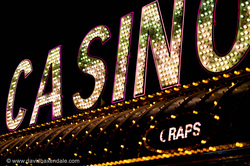
Only two states, Hawaii and Utah, do not allow gambling in any form, and full-scale non-reservation casino gambling has been growing, spreading to almost half of all states, and particularly in the Northeast.
| | But the foes of legal gambling believe Massachusetts can stem that tide and actually begin momentum in the other direction. In fact, Les Burnal, the national director of Stop Predatory Gambling, believes that will happen regardless of what Bay State voters do in November. “It (gambling) has been a failed experiment,” he told me from Massachusetts. “You will see what is happening here spread across the United States.” Bernal has visited the Deseret News editorial board a few times. It would be difficult to accuse him of not being passionate enough about his cause or of having a lack of faith that his side will prevail, but such a pronouncement seems a bit optimistic even for him. However, he believes the key to success lies in the way gambling naturally leads to “unfairness and an inequality of opportunity.” In simple language, casinos prey on the poor, as do lotteries and other forms of legal gambling, and this seems to be dawning on the residents of Massachusetts. Bernal believes it will dawn on people everywhere before long. States that expanded gambling as a consequence of the great recession are finding that casinos don’t bring in the money promised, and politicians in those states still have to make the tough budgets decisions they had hoped to avoid. One of those states, Illinois, may be celebrating that its unemployment rate fell to 7.5 percent in May, but Hawaii’s stood at 4.4 percent and Utah’s at 3.6 percent. While many factors contribute to a state’s economy, Hawaii and Utah have shown how to thrive without gambling. In Massachusetts, politicians are beginning to take sides on the issue. Don Berwick, a Democrat running for governor, opposes casino gambling, saying on his web site, “I don’t believe that we should be teaching our children that economic development is best achieved through gambling institutions.” Maura Healey, a Democrat running for attorney general, agrees. She has made a campaign issue out of her opponent’s alleged connections to an online gambling company. The web site Masslive.com quoted her as saying the gambling industry “is an industry that’s built around preying upon people.” Even Gov. Deval Patrick, who signed the casino bill three years ago, has said he wouldn’t want one in his city, according to the Boston Globe. Polls seem to show tepid support for gambling, at best, in Massachusetts. The Boston Globe found 52 percent favor casinos, while a recent poll by Suffolk University put the number at 37 percent. Naturally, the gambling industry plans to spend a lot of money to defeat the initiative, focusing on the promises of jobs and tax revenue. Bernal finds some irony in that. In a nation where gambling is everywhere, it shouldn’t be necessary to educate anyone about its virtues if they exist, he said. Gambling’s opponents say legal gambling has a record just about as sordid as illegal gambling, with the exception that it enjoys, in many states, full fellowship with government. Writing in the New York Times recently, Barbara Dafoe Whitehead, director of civil society initiatives at the Institute for American Values, noted that states do not force gambling companies to disclose information about how they entice customers to keep playing or what personal data they gather, even though gambling is closely tied to tax revenue. Taxpayers ought to be able to see the methods used to extract money for public purposes, especially from an industry many consider immoral. Yes, Massachusetts in only one state. And yes, it is much easier to defeat casinos before one has even started to operate. It is instructive, however, to see a glimmer of hope that a nationwide trend toward something-for-nothing can be stemmed. |

 RSS Feed
RSS Feed

